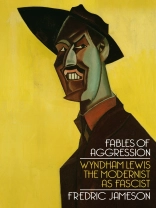The novels of Wyndham Lewis have generally been associated with the work of the great modernists-Joyce, Pound, Eliot, Yeats-who were his sometime friends and collaborators. Lewis’s originality, however, can only be fully grasped when it is understood that, unlike those writers, he was essentially a political novelist.
In this now classic study, Fredric Jameson proposes a framework in which Lewis’s explosive language practice-utterly unlike any other English or American modernism-can be grasped as a political and symbolic act. He does not, however, ask us to admire the energy of Lewis’s style without confronting the inescapable and often scandalous ideological content of Lewis’s works: the aggressivity and sexism, the predilection for racial and national categories, the brief flirtation with fascism, and the inveterate and cranky oppositionalism that informs his powerful polemics against virtually all the political and countercultural tendencies of his time.
Fables of Aggression draws on the methods of narrative analysis and semiotics, psychoanalysis, and ideological analysis to construct a dynamic model of the contradictions from which Lewis’s incomparable narrative corpus is generated, and of which it offers so many varying symbolic resolutions.
Circa l’autore
Fredric Jameson is Distinguished Professor of Comparative Literature at Duke University. The author of numerous books, he has over the last three decades developed a richly nuanced vision of Western culture’s relation to political economy. He was a recipient of the 2008 Holberg International Memorial Prize. He is the author of many books, including Postmodernism, Or, The Cultural Logic of Late Capitalism, The Cultural Turn, A Singular Modernity, The Modernist Papers, Archaeologies of the Future, Brecht and Method, Ideologies of Theory, Valences of the Dialectic, The Hegel Variations and Representing Capital.












